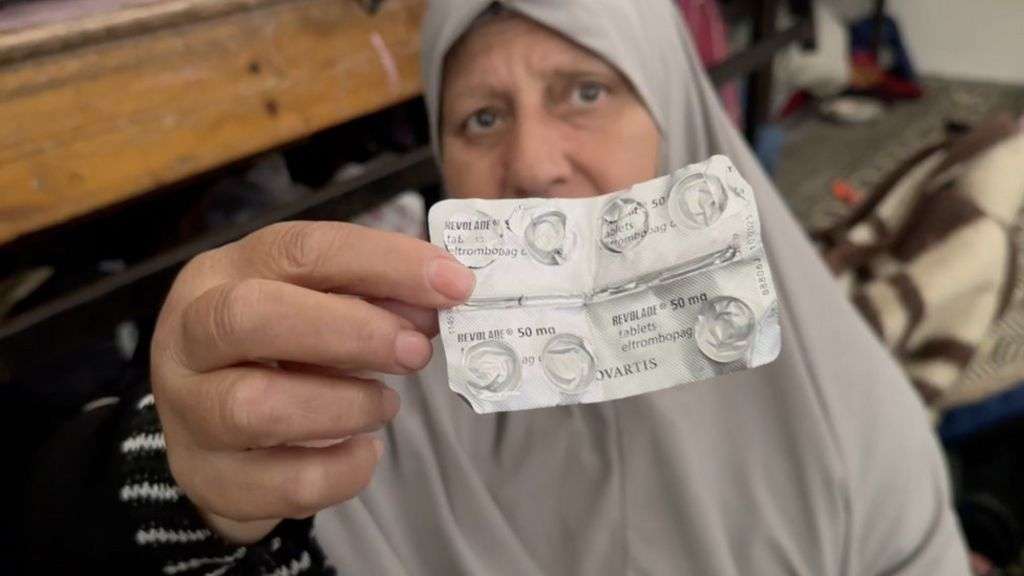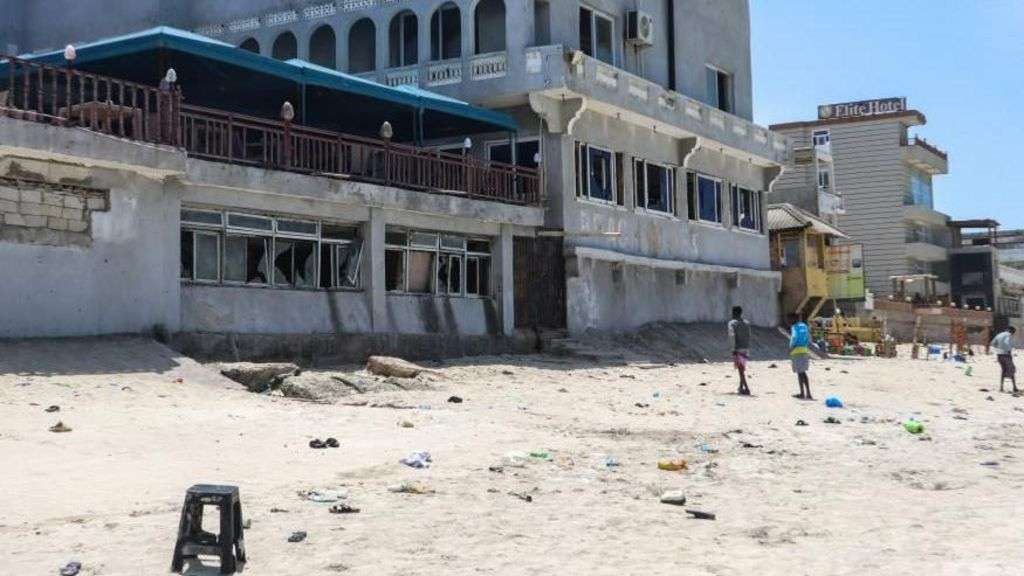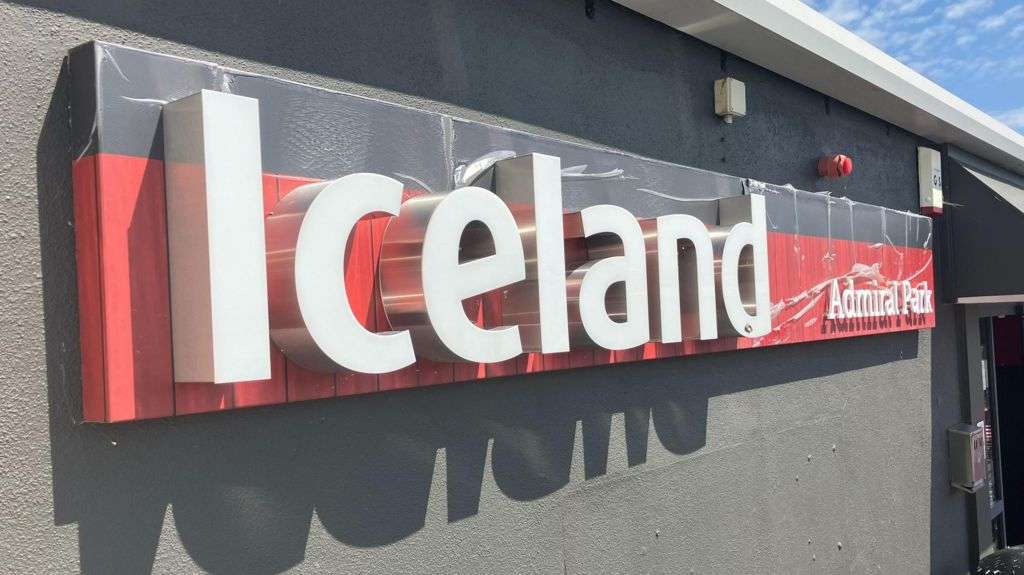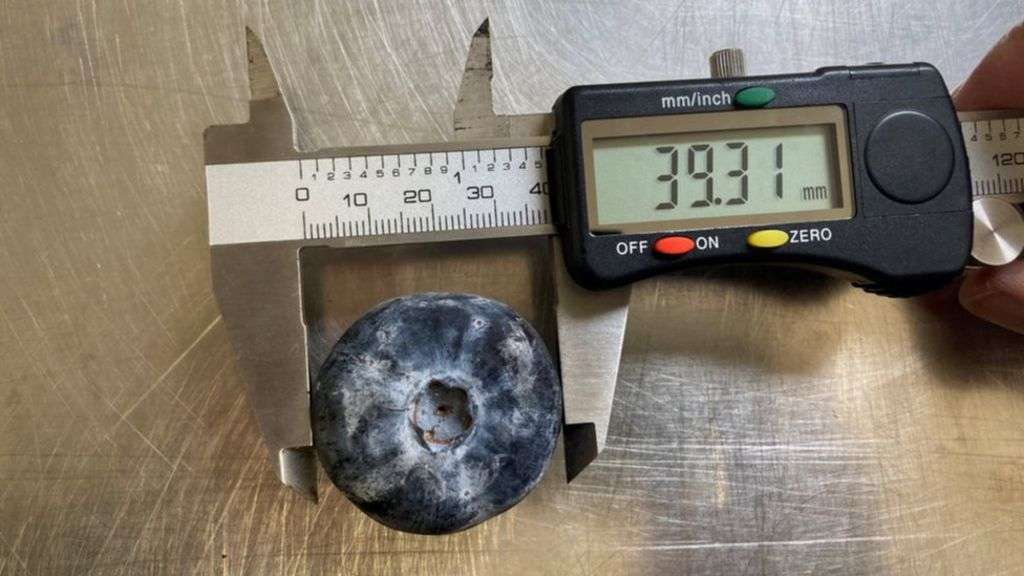"My medicine is finished. I'm so tired. I can hardly see in front of me. My chemotherapy ran out a long time ago," said Siham. The 62-year-old has leukaemia. Before the war broke out she was being treated at the Turkish-Palestinian Friendship Hospital in north Gaza - the only cancer hospital in the Strip. She's one of approximately 10,000 cancer patients in Gaza - according to figures from Gaza's Hamas-run health ministry - who have been unable to get treatment or medicines since the hospital shut down in the first week of November due to fuel shortages. Like other displaced Palestinians in Gaza - of which the UN estimates there are 1.7 million - Siham fled her home in the north when her neighbourhood was hit by air strikes. When we spoke, she was sheltering with her daughter, who has a newborn baby, in a school in Rafah run by the UN agency for Palestinian refugees, UNRWA.
She has been trying to leave for life-saving treatment for months, but has been turned away at the Rafah border crossing five times since the war began - it is currently the only way out of Gaza.
All border crossings with Gaza were closed for almost four weeks after Hamas attacked Israel on 7 October, killing more than 1,200 people and taking 253 others as hostages. Israel's subsequent military campaign in Gaza has killed more than 31,000 Palestinians and left more than 73,000 injured, according to the health ministry.
In November, Egypt reopened the Rafah crossing to allow Egyptian citizens and other foreign passport holders to leave, as well as seriously injured and sick Palestinians.
A recent report by Gaza's health ministry said more than 2,600 patients had been evacuated via Rafah, comprising 1,700 wounded and 900 sick.
Egypt, Turkey, the UAE and Jordan have pledged to treat thousands of cancer patients like Siham, as well as those injured in the war.
A daily list is published by the Palestinian border authority with names of the people who have been approved by Egypt and Israel to leave. Siham's name first appeared on the list published on 19 November for evacuation to Turkey. But she was turned away by border agents when she arrived at the crossing.
"They said the Turkish envoy hadn't arrived. Is our life not as important as the arrival of the Turkish envoy? How is someone supposed to get out? Or is it because we're not well connected?" she said.
Palestinian border agents said that because the Turkish envoy was not there to receive Siham on the Egyptian side, they could not let her through. But we have spoken to others who were allowed to travel to Turkey that day.
Mona Al-Shorafi was diagnosed with breast cancer three years ago, and had been receiving treatment in Jerusalem before 7 October. She had been co-ordinating an initiative to provide psychological support for other cancer survivors and was just three days away from her next chemotherapy session when the war began.
"We had to leave our homes and stay in shelters and schools with many other families, and we were very worried because of our weak immune systems," she said.
Mona's name was on the same evacuation list as Siham's on 19 November. She was allowed to cross the border to Egypt, and boarded a plane to Ankara along with more than 130 others, she told us. She was even allowed to take her two young daughters with her, although each patient is only officially allowed one companion.
"I had decided that if they turned one of my daughters back I wouldn't cross, I couldn't leave them behind," said Mona. Her husband and sons are still living in a tent in the Tal al-Sultan area of Rafah.
Palestinian border authorities in Gaza did not respond to our questions about why Siham was refused permission to leave.
We have spoken to two other cancer patients who were turned away at the border despite their names being on the evacuation lists.
One of them, who did not want to be named, told us he was also supposed to leave on 19 November, but believed he was turned away because his companion was his young son. He said Palestinian border authorities prefer female companions for evacuees, in order to reduce the chances that those leaving could be Hamas fighters.
Another patient, who was supposed to be evacuated to the UAE for treatment in December, was told at the border that the officials could not find her name.
Dr Sobhi Skaik, Director of the Turkish-Palestinian Friendship Hospital in Gaza, told us that out of Gaza's estimated 10,000 cancer patients, "the names of approximately 3,800 have been given permission to leave Gaza for treatment abroad, but in reality only around 600 have left the Gaza strip since the start of the war, whether adults or children".
How does the evacuation process work?
We have spoken to doctors in Gaza, Palestinian health ministry officials in the occupied West Bank, and Palestinian diplomats in Egypt to better understand the complex evacuation process.
A doctor or hospital in Gaza nominates the patients in need of the most urgent medical care to the Hamas-run health ministry in Gaza. Those names are then sent to the Egyptian authorities, who run a security check. Once Egypt has approved the list, it is then vetted by the Israeli authorities, who must also approve the names.
When the final list is approved, it is shared with the countries who have said they are willing to receive patients and is published online. Each group of patients is approved for travel on a specific date. But whether a patient is ultimately allowed to leave is up to the discretion of the Palestinian border authorities.
In response to why more patients were not being allowed through, the Israeli ministry of defence told us: "The Rafah crossing is governed by Egypt. There is, therefore, no restriction as far as Israel is concerned regarding the number of patients that can cross at the Rafah crossing to obtain medical treatment outside the Gaza Strip."
The Egyptian health ministry, the Egyptian foreign ministry, and the Palestinian border authorities declined to answer our questions on the evacuation process of patients from Gaza.
Turkey said in early November that it was willing to take up to 1,000 cancer patients, while the UAE announced that it would also take in 1,000 cancer patients and 1,000 injured children.
Turkish officials told us the country was currently treating several hundred cancer patients and injured from Gaza, and it was willing to receive hundreds more.
"If Gaza gives us a list of 600 people, we do not pick and choose a certain number of those. For us, the more patients and injured people who can be sent, the better. We have the capacity to treat all of them," one of them said.
Pay your way out
But there are other ways people are getting out of Gaza.
The war has given rise to a lucrative monopoly, with one Egyptian travel agency, Hala, reported to be charging Palestinians $5,000 (£3,900) per person to leave Gaza within one to two weeks.
Before the war, it used to charge about $350 (£274) per person to go from Gaza to Egypt. After 7 October, the price reportedly rocketed to almost $12,000 per person, before the company limited it to $5,000 for an adult Palestinian and $2,500 for a child - though Hala does not officially advertise this. This cost of evacuating one adult is more than four times the average annual salary in Gaza.
Outside Hala's offices in Cairo, people crowd daily, trying to get a foot through the door.
One Palestinian man, who did not want to be named, told us he had to pay to enter the company's office, and made another extra payment of $300 to a member of staff at Hala to get his family on the evacuation list. This was in addition to the $10,000 he paid to evacuate his wife and two children.
We spoke to 10 people who used Hala's services to try to leave Gaza who said they had made payments of up to $4,000 to employees in order to secure preferential treatment for their families' evacuations. Some of them have left and some are still waiting to leave.
The high demand has also given rise to a secondary market of brokers who prey on the desperation of Palestinians with families trapped in Gaza and claim they can get people to the top of the evacuation list - for a price.
One broker in Egypt told a woman that she could pay him an extra $2,500 to get her family in Gaza on the evacuation list. In voice messages that she shared with us, the broker says that his contact in Hala "has to hold the money in his hand" before he registers the names and insists: "I'm doing this to help you, I'm not taking one [Israeli] shekel even."
But the best connected in Gaza can leave without paying at all.
We found the names of Palestinians who left Gaza posing as Egyptian citizens, who told us they were helped to leave Gaza by people with political connections, who had added their names to the Egyptian citizens' list.
Another woman, whose son needed urgent medical care, said people with political connections helped them to get on to a special VIP list, which is not published online.
She told us that her son's name "did not show up on the health ministry's list. His name was on another special list" which was read out at the border.
Neither Hala nor the Egyptian foreign ministry responded to our questions about the company's activities.
Egypt's Foreign Minister Sameh Shoukry previously told Sky News that his country was investigating.
"We will take whatever measures that we need so as to restrict it and eliminate it immediately," he said, without giving further details.
In January, Egypt's State Information Service head Diaa Rashwan said it "categorically denied the allegations related to the collection of additional fees from travellers from Gaza, as well as claims that an unofficial entity collected fees for the passage to Egyptian lands".
In Gaza, time is running out for Siham and cancer patients like her, who are caught up in murky regulations and red tape at the border.
Desperate to get her out, her son Saqr told us he tried to arrange for her to be evacuated through the Hala company.
"If we had the money we wouldn't have hesitated. When we asked about a private evacuation they said the minimum Hala asks for is $5,000, but we can't afford $5,000."
After her first attempt to cross, Siham said she went back to the border four more times to see if they would let her through, as her name had already been approved. But she was refused by Palestinian border authorities, and her health is now quickly deteriorating.
"I can hardly walk a step without feeling dizzy now. I don't know what they're waiting for," she said.








